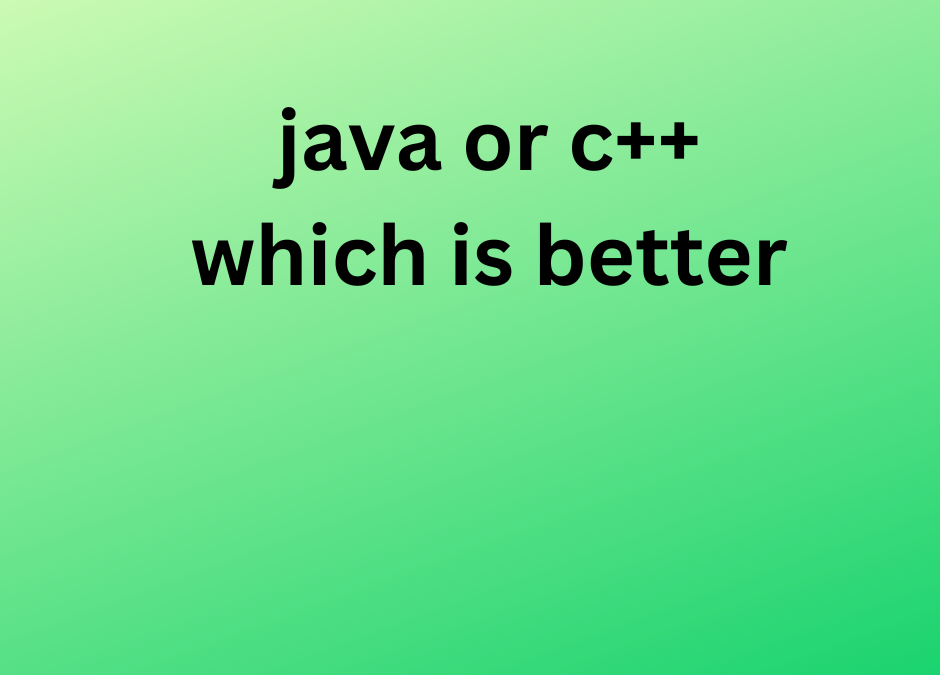The choice between Java and C++ depends on several factors, including the specific use case, your requirements, and personal preferences. Both languages have their strengths and weaknesses. Here are some considerations:
Java:
- Simplicity: Java is often considered easier to learn and use compared to C++. It has a straightforward syntax and extensive libraries, which makes development faster.
- Platform independence: Java programs can run on any platform with a Java Virtual Machine (JVM), making it highly portable.
- Garbage collection: Java handles memory management automatically through garbage collection, reducing the risk of memory leaks and making it more beginner-friendly.
- Strong ecosystem: Java has a vast community and extensive libraries, frameworks, and tools available for various purposes, such as web development (Java EE), Android app development (Java for Android), and more.
- java training in coimbatore will help students to understand the object-oriented programming in a better way. They will get an understanding of how to write a program using Java. The course also includes a session on how to debug programs written in Java.
C++
- Performance: C++ is known for its high performance and efficiency. It provides low-level control over system resources and allows for direct memory manipulation.
- System-level programming: C++ is often used for system-level programming, game development, embedded systems, and other performance-critical applications.
- Closer to hardware: C++ enables direct hardware access and efficient memory management, which makes it suitable for tasks that require fine-grained control.
- Wider application range: While Java is popular for enterprise and web development, C++ is used in a broader range of domains, including gaming, scientific computing, and high-frequency trading.
Ultimately, the choice depends on the specific requirements of your project, the ecosystem you prefer, and your familiarity with the language. If you prioritize ease of development and platform independence, Java might be a better choice. However, if performance and low-level control are crucial, C++ could be a more suitable option.
Memory Management:
- Java has automatic memory management through garbage collection, which helps prevent memory leaks and simplifies memory management for developers. In contrast, C++ requires manual memory management using techniques like constructors, destructors, and explicit memory deallocation with
deleteor smart pointers. This manual memory management in C++ gives developers more control but also increases the risk of memory-related bugs.
Object-Oriented Programming (OOP):
- Both Java and C++ support object-oriented programming. However, Java enforces strict adherence to OOP principles with features like classes, inheritance, and interfaces. In C++, you have the flexibility to use OOP concepts as well as procedural programming techniques, giving you more options for coding styles.
Concurrency:
- Java provides built-in support for multithreading and concurrency with its Thread API and high-level concurrency utilities like the Executor framework and synchronized blocks. C++ offers concurrency support through threading libraries like POSIX threads (pthreads) and the C++11 thread library, but it requires more manual handling of synchronization and can be more complex.
Performance vs. Development Speed:
- C++ generally offers better performance than Java due to its ability to directly manipulate memory and hardware resources. However, Java’s just-in-time (JIT) compilation and optimization can narrow the performance gap in certain scenarios. Java’s emphasis on productivity, extensive libraries, and automatic memory management can lead to faster development times compared to C++.
Community and Resources:
- Both Java and C++ have large and active developer communities, providing access to forums, libraries, frameworks, and tutorials. However, Java’s community is often considered larger and more mature, with extensive resources available for various application domains.
Existing Codebase and Ecosystem:
- If you have an existing codebase or a specific ecosystem requirement, that may influence your choice. For example, if you’re developing Android applications, Java (or Kotlin) is the primary language supported by the Android SDK. If you’re working on projects that require compatibility with existing C or C++ code, or you need to interact with low-level system components, C++ may be a better fit.
Ultimately, the “better” choice depends on your specific needs, project requirements, and your personal expertise. Consider the factors mentioned above, weigh your priorities, and choose the language that aligns best with your goals

